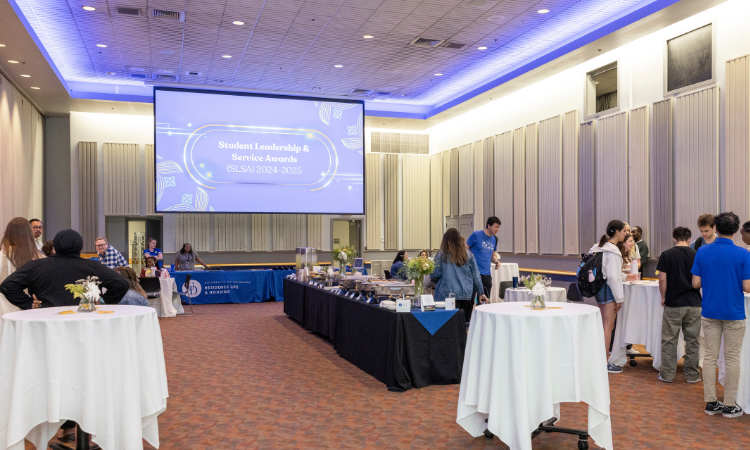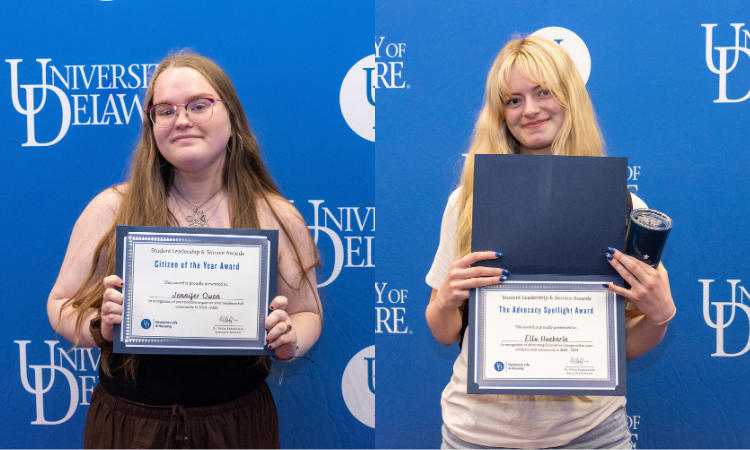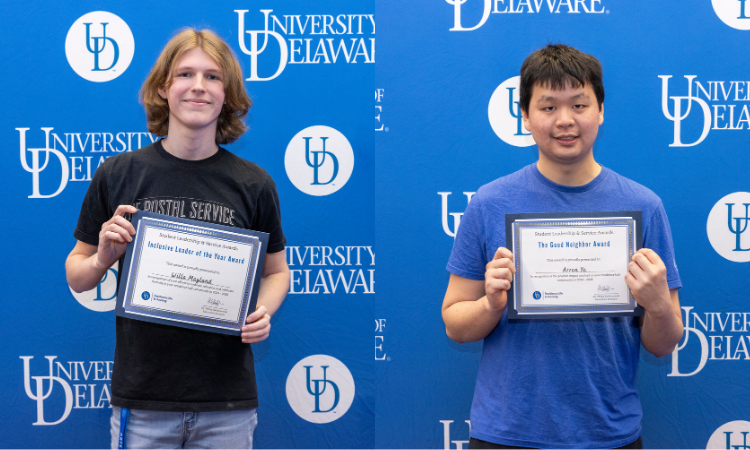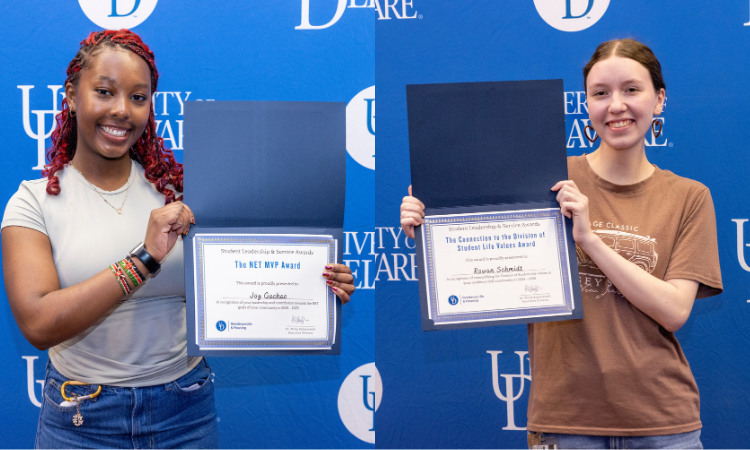

Life in Our Halls
Life in Our Halls
The residence halls are our Blue Hens' home at UD. We provide students with different opportunities to help them make connections with others and support their personal growth and development. Students can learn through workshops, programs, and even by meeting with their RA individually or as a group.
Student Leadership & Service Awards (SLSA)
The Student Leadership & Service Awards (SLSA) are an opportunity for Residence Life and Housing to recognize accomplishments and contributions that our students make within their residence hall communities. Student Leadership and Service Awards also celebrate all the exciting programs and work our students complete throughout the year. All students and staff are welcome to submit nominations. Students can be nominated for their residence hall contributions for nine different award categories!
Nominations for the 2024-2025 academic year are closed. Congrats to all of our 2024-2025 SLSA winners!
SLSA Awards Categories:
This award recognizes the efforts of an individual, group, or initiative that has advocated to positively impact change within the residence halls. The change efforts and/or initiative was one that reinforced and represented the needs and voices of the community. This award highlights actions carried out through implementation of awareness campaigns, programming, and/or community initiatives that impact students within the residence hall community. An individual or initiative nominated for this award should have identified community needs and contributed in a positive manner to the resolution of that need.
- Nominations may range anywhere from 350 to 600 words.
This award recognizes programs and events that are student initiated and implemented in the halls with community building in mind. The nomination should demonstrate how the program has had an impact on a residence hall community, as well as how the program was planned and implemented by students.
- The nomination statement should summarize the scope and impact of the program on the residential community and how the program was planned and implemented (see above description for more information).
- Nominations may range anywhere from 350 to 800 words in length
This award recognizes an individual who has served in a leadership capacity in their current Neighborhood Empowerment Team and has demonstrated leadership towards the NET goals and missions above and beyond what is expected. The nomination should include detailed examples of their contribution to the floor; how the individual has worked towards creating a sense of community on their floor; how the individual has motivated others in the floor community to participate in NET through SIP's, Community Wide Programs, Spirit Week, and more. Student and staff testimonials are encouraged in nomination letters. Multiple leaders may be recognized for this award Student and staff testimonials are encouraged in nomination letters. Multiple leaders may be recognized for this award.
- This nomination should include a summary of the scope and impact of the leader on their residential community and leadership in fostering a strong NET community (see above description for more information).
- Nominations may range anywhere from 350 to 800 words in length.
This recognition highlights individuals who have had a positive impact on the residence hall experience of another student or students. This award should recognize a resident who has helped make living on campus an experience characterized by kindness, friendship, personal growth, and/or learning. Multiple students may be recognized for this initiative.
- Nominations should include support detailing this resident’s contribution(s) to individuals or the community.
- Nominations may range anywhere from 350 to 600 words.
This award recognizes the efforts and contributions of a student in advancing the UD commitment to embrace, enhance and celebrate diversity in their floor, building, and/or area. The nominee should have a) demonstrated respectful and inclusive ways of being when interacting with others in their floor, building, and/or area; b) promoted, enhanced, and implemented an event that promoted perspective building amongst residents c) advocated for inclusion of underrepresented groups where students feel a sense of belonging in the floor, building, and/or area.
- The nomination statement should summarize the scope and impact of the individual’s contributions to the community.
- Nominations may range anywhere from 350 to 800 words in length.
This award recognizes any community: floor, multiple floors, building, complex, Special Interest Housing or Living Learning communities whose individual members have been significantly involved in the growth and development of the community. The nominated communities also may have made contributions to the larger complex and/or University community. The nomination should include detailed examples of resident involvement in the community (this may include information about NET activities); benefits to individuals in the community; and contributions to complex and University communities. Up to two awards may be given.
- The nomination statement should summarize the involvement of community members and any significant contribution to the larger complex or University community. This nomination should capture why this community is unique to other communities throughout campus.
- Nominations may range anywhere from 350 to 800 words in length.
- At least one statement of support from a staff member is required and should focus on personal knowledge of the nominated community and the community’s contributions to the residence halls. Multiple statements of support will be accepted and each statement can range from at least 1 paragraph to 1 page (350 words minimum).
This award recognizes an individual who has demonstrated a commitment to their community above and beyond what is typically expected of residential students. This award should recognize a resident who is a great role model, and has positively impacted the residential experience of those around them. Nominations should include support detailing this resident’s involvement in complex activities; change they have initiated in self, peers, or the community; and/or other contributions this student has made to their community. Up to two awards will be given (one for First-Year area and one for Upper Division).
- The nomination statement should highlight the impact and contributions to their community outside of formal or elected leadership roles (see above description for more information).
- Nominations may range anywhere from 350 to 800 words in length.
- At least one statement of support from a staff member is required and should focus on personal interactions and observations of the nominee. Multiple statements of support will be accepted and each statement can range from at least 1 paragraph to 1 page (350 words minimum).
This award recognizes a student who embodies the Division of Student Life Values of Amplifying Student Voices, Pursuing Equity, Transformational Collaboration, Learning & Innovation, and Integrity & Respect. Read more about these values on our About Us page. As the Division of Student Life pursues excellence, these values guide our interactions, our decision-making, and ultimately the collective culture we build that enables Residence Life and Housing to achieve our vision and mission. This award should recognize an individual who exemplifies one or more of these values through their contributions in their residence hall or community.
- The nomination statement should include support detailing this individual’s ability to embody the Division of Student Life Values through their actions towards others and within their floor or building communities. Please articulate how the student demonstrates a connection to one or more of those values.
- Nominations may range anywhere from 350 to 600 words.
This award recognizes an individual, organization, or department whose work and efforts to collaborate have contributed to enhance the residence hall experience through day to day interactions with students in the residence halls.
- The nomination statement should address how the nominee has made an impact through their work with students and what outstanding contributions they have made to the floor or building community (examples include but are not limited to, Custodial Staff, Facilities, Dining, Disability Support Services, Student Health Services, Counseling Services Staff).
- Nominations may range anywhere from 350 to 600 words.
“Contributing to my community allowed me to grow my connections with my peers and strengthen my friendships!"
Good Neighbor Award Winner
Congratulations to the 2025 SLSA award winners!
Advocacy Spotlight Award: Ella Haeberle
Citizen of the Year Award: Jennifer Owen & Sarah Pienkos
Community of the Year: Russell 2A & Russell 2D
Connection to the Division of Student Life Values Award: Rowan Schmidt
Good Neighbor Award: Adasia Harris, Aaron Ye, Catherine Williams, Collin Burnett, Delaney Jewell, Drew Tendler, Esosa Isokpan, Ethan Rocco, Keila Diaz, Savannah Harris
Inclusive Leader of the Year Award: Willa Magland
NET MVP Award: Ashley Yee, Jack Whittle, Joy Gachao
Partnership Award: John Maloney & UD Facilities
Student Initiated Program Award: Alyssa Luberoff, Carly Cantagallo, Hailey Bender, Micah Stoogenke
“I was really nervous to meet new people when I started college, but I knew that I loved to plan events and bring people together. Once I knew about NET and SIPs I was able to use what I was good at and enjoyed to bring the community together and meet new people! I was able to meet people of all different backgrounds with different hobbies and passions that opened my eyes to see all that community living had to offer. I tried new things and made new friends by putting myself out there.”
NET Leader of the Year Award Winner and RAILE Gold Certificate Recipient
Blue Hen Support
We're devoted to supporting Blue Hens in their academic, personal and professional success, and these in-hall programs help us do just that.
In-Hall Programs
RA Catch Ups are one-on-one conversations with your RA about your experience at UD so far and your goals for life after UD. Our RAs are trained to help students get connected with resources on campus to support students through their time at UD.
Your RA will first reach out during Move-in and again later in the semester to schedule a Catch up, but they are always there if you need them. Connect with your RA or Residence Hall Coordinator for more info or if you want to meet with them.
Roommate Goals is a helpful tool to help you and your roommate(s) discuss shared spaces, develop expectations, and proactively talk about how you'll handle conflict.
Contact your RA or Residence Hall Coordinator for more information.
Get Involved: RA Catch Ups: youtube.com/watch?v=O4YnBo1fPaM
Neighborhood Empowerment Teams (NET)
NET inspires all members of the floor to contribute to and support the community by maintaining a safe, inclusive, and welcoming environment. Become a leader on campus by being a NET Captain! It's a great opportunity for students to gain leadership skills within a smaller community. Connect with your RA or RHC if you are interested in becoming a NET Captain, contact your RHC.
Get Involved: Neighborhood Empowerment Team: youtube.com/watch?v=a9MTx_HNKm0
Common Questions
NET Captains are the student leaders of their community that work, in collaboration with their RA, to build a welcoming, inclusive, and safe environment on their floor. They have the opportunity to host Student Initiated Programs (SIP), encourage other students to join committees, and advocate for the needs of those who live on their floor.
NET Challenges are monthly activities for community bonding and to help students connect to University, community, and floor events! Each month, a new challenge will be revealed and floor communities are expected to collaborate to achieve the goal of the challenge. RA staff will announce the challenges during community meetings and work with the NET Captain(s), NET Floor Representatives, and members of the floor community to implement the Challenge.
Student Initiated Programs
Are you looking for an opportunity to host an event for your community? Check out our Student Initiated Programs (SIPs)! Hosting a Student Initiated Program is a great way for you to have a positive impact on your community and grow in your own skills. Funding (up to $40) for this program is available through an easy request process. If you’d like to plan and host your own event, talk to your RA or Residence Hall Coordinator.
Get Involved: Student Initiated Programs: youtube.com/watch?v=JZ-7XwA2haY
Before You Host a Program
Log into your My Housing Portal and submit a Program Request in the Program Requests and Roommate Agreements section.
Program requests must be completed at least one week prior to your intended program date.
Not sure where to start? Talk with your Residence Hall Coordinator or Graduate Hall Director!
After You Host a Program
After you have hosted your event, fill out the Post Event Form to tell us how your event went and get reimbursed for your program. Post Event Forms must be completed within one week of the date your program was held.
Follow your community on Instagram!
| Building Name | Instagram Account |
| George Read | @GeorgeReadRLH |
| Redding | @LouisReddingRLH |
| Gilbert | @GilbertRLH |
| Russell | @RussellRLH |
| Smyth | @SmythRLH |
| Lane & Thompson | @lanethompsonRLH |
| South Academy | @SouthAcademy |
| Caesar Rodney | @CaesarRodneyRLH |
| James Smith, Thomas McKean | @SmithMcKean |
| Ray Street | @RayStRLH |
| North Central | @NorthCentralRLH |
| South Central | @SouthCentralRLH |
| Independence | @IndyRLH |
| Apartments | @RLHApartments |






